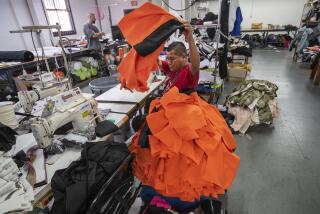Factory Output Increases in June
- Share via
Manufacturing--knocked down by last year’s recession--in June turned in its strongest performance in nearly two years, but construction spending in May dipped to a five-month low.
The latest snapshot of the economy Monday suggested the recovery remains on track but improvements are spotty, economists said.
The Institute for Supply Management’s manufacturing index jumped to 56.2 in June, the highest level since February 2000, and up from a reading of 55.7 in May. An index above 50 signifies growth in manufacturing, while a figure below 50 shows contraction. It marked the fifth month in a row that manufacturing expanded.
That’s good news for the economy and for manufacturing, which cut production during the slump and saw hundreds of thousands of jobs evaporate.
“Manufacturers are staging a valiant comeback ... but that comeback has not developed to the point where factories are rehiring in any great numbers,” said economist Ken Mayland, president of ClearView Economics. “We’re close, but not quite there yet.”
ISM’s manufacturing index in June was stronger than the 55.5 reading many analysts were forecasting.
But construction spending turned out to be weaker than expected. The value of all construction projects dropped 0.7% in May to a seasonally adjusted annual rate of $852 billion, the lowest level since December, the Commerce Department said. Many analysts were predicting a 0.3% increase. The decline followed a 0.4% rise in April in construction spending.
May’s performance reflected a 3.1% drop in private builders’ spending on commercial projects, such as office buildings and industrial complexes, which fell to a rate of $173 billion.
Throughout the slump, the residential side of the construction market powered ahead as low mortgage rates motivated home buyers.
However, the commercial side has been turning in lackluster performances as businesses cut investment in new plants and buildings. They probably won’t step up such investment until they feel more assured about the recovery, economists said.
More to Read
Inside the business of entertainment
The Wide Shot brings you news, analysis and insights on everything from streaming wars to production — and what it all means for the future.
You may occasionally receive promotional content from the Los Angeles Times.









